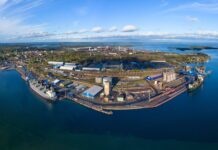Swedish shipping company Wallenius SOL has said its new ice-class liquefied natural gas- (LNG) powered RoRo vessels will have a significantly lower environmental impact compared with older ships. According to the independent Swedish Environmental Research Institute (IVL), hull design had a major beneficial effect on energy efficiency. The vessels are currently under construction at the Raffles shipyard in China, where the project is led by Wallenius Marine.
Wallenius said the design of these RoRos contributes to enhanced efficiency due to the hydrodynamic characteristics of the hull and the ability of the designers to keep the weight down.
“The slimmer a hull is, the less fuel it uses. But at the same time, a ship must have a high load capacity. I think we’ve achieved a good balance between an ample and slim hull, which in turn provides a good trade-off between load capacity and fuel consumption,” said Wallenius SOL’s Martin Carlweitz .
Powering ships with LNG almost eliminates sulfur oxide (SOx) and particulates, while nitrogen oxide (NOx) emissions are reduced. LNG is still a fossil fuel, but thanks to the improved energy efficiency, greenhouse gas emissions are also significantly reduced. The new ships will reduce emissions of greenhouse gases (63%), NOx (96%), SOx (99%) and particulates (99%).
“We see LNG as the best realistic fuel option right now. LNG will have to be a step on the road toward the biofuels for which our ships are ready, but the production of such alternatives is currently too low at present. The ships are also prepared for what is known as peak shaving, where surplus power from the engines is used to charge a battery,” added Carlweitz.
In the next step, IVL has been commissioned to produce a report on the socio-economic impact of the ships’ emissions. “All emissions have a negative effect on society, and lead to increased costs for such things as healthcare and the impact on vegetation. This is especially true of ships,” said Erik Fridell, who works with maritime issues at IVL. “But what I can say right now is that we’re seeing a significant reduction in the cost to society from this new class of ship compared to present day tonnage.”





